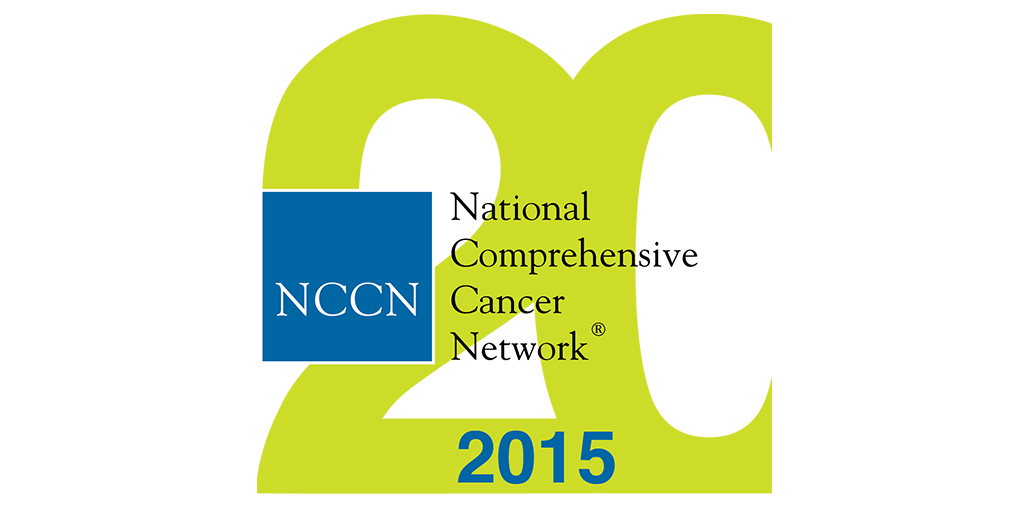Video Post: Dr. Bob Carlson and Joan McClure Discuss the National Comprehensive Cancer Network Guidelines
The National Comprehensive Cancer Network (NCCN) is a non-profit organization, created by an alliance of 26 leading cancer centers in the United States. At the National Coalition for Cancer Survivorship’s 2015 Spring Cancer Policy Roundtable, Dr. Bob Carlson and Joan McClure of NCCN sat down with us to talk about their organization’s Clinical Practice Guidelines. In this clip, Dr. Carlson and Ms. McClure explain the organization’s principles and detail the thorough process of evaluating new cancer treatments and how they make their recommendations for the advancement of quality cancer care.
The NCCN guidelines have been “translated” to easy-to-understand language in order to inform patients and caregivers about all of the available treatment options for their disease. They are available for free on the NCCN Patient website.
VIDEO TRANSCRIPT
Carlson: With the advent of new payment models, the NCCN guidelines will assume even greater importance in maintaining the optimal standard of care for patients with cancer. The NCCN guidelines are developed by expert, multi-disciplinary panels with patient advocacy members.
McClure: We have 49 separate panels and developed 61 difference clinical practice guidelines for treating cancer. All of our panels are multi-disciplinary. We have, as a core, medical oncologists, surgical oncologists, radiation oncologists, and pathologists on our panels but we also have other ancillary specialties as required by a particular disease site.
Carlson: The panels specifically evaluate the evidence in support of various therapies and encode those optimal, evidence-based therapies into the guidelines themselves. Important in the principles of inclusion of therapies or treatment options in the guidelines is first of all the evidence that supports the therapy and our guidelines are always annotated with the level of evidence specifically behind each recommendation.
McClure: One of the things that we are most concerned about is ensuring that the quality of our information is always up to date. So each one of our guidelines is reviewed by the multi-disciplinary teams at our member institutions at least annually and the guideline is completely reviewed by the guidelines panel. We also do interim updates when there’s a change in the data that supports various treatments that could change the standard of care. So if there’s a new agent approved by the FDA, or if a clinical, a large important clinical trial is stopped for either efficacy or toxicity, or an important publication comes out, our panel will meet on an interim basis to update the guideline. We believe in transparency, all of our guidelines and recommendations are available free of charge on our website, www.nccn.org. They’re available to clinicians, to patients, to anyone who has an interest in the guidelines free of charge.
We look at each recommendation in terms of the efficacy, the safety of the intervention, the quality and quantity of data, and the consistency of the data. And this year our panels are going to be starting to look also at the affordability of a regimen. And over the next year or so these data will become available to users of our clinical practice guidelines to allow patients and clinicians to make decisions about what is valuable to them.
Carlson: We want to include all of the options that would be most reasonable for patients and physicians to consider. We think that choice is important because the various therapies that individuals consider, or the various dimensions of therapies that an individual consider might vary from one patient to another. One patient may think that the effectiveness of the therapy is the only consideration that they would have, while another patient may be very concerned about a specific toxicity and yet another patient may be overly concerned, or be appropriately overly concerned, about cost of care. And so the maintenance of choice allows patients to make individualized treatment-based decisions. As we move into new payment models as well, having those options that define what the appropriate standard of care is means that patients and physicians can look at those options and if they select one of those options and move forward with one of those options, they may be confident that the decision is not being made strictly upon cost or some other incentive that may exist to choose one thing over the other. Again, patient choice and physician choice is central to our guidelines’ philosophy.
*****
About the Contributors: Robert W. Carlson, MD—Dr. Carlson is the Chief Executive Officer (CEO) at the National Comprehensive Cancer Network (NCCN). He joined NCCN as CEO in January 2013 following an esteemed history of leadership positions within the organization including, most notably, Representative to the NCCN Board of Directors, Chair of the Breast Cancer Guidelines Panel, Member and Founding Chair of the Breast Cancer Risk Reduction Guidelines Panel, and Chair of the Survivorship Guidelines Panel. Joan S. McClure, MS—Ms. McClure is Senior Vice President of Clinical Information and Publications for the National Comprehensive Cancer Network (NCCN). Ms. McClure’s group develops the NCCN Clinical Practice Guidelines in Oncology (NCCN Guidelines®), associated NCCN Guidelines for Patients®, the NCCN Drugs & Biologics Compendium(NCCN Compendium®), NCCN Chemotherapy Orders Templates (NCCN Templates®), the NCCN Biomarkers Compendium®, and JNCCN — Journal of the National Comprehensive Cancer Network. Ms. McClure also serves as an Associate Editor for JNCCN.
The views & opinions expressed in any guest post featured on our site are those of the guest author and do not necessarily reflect the opinions & views of the National Coalition for Cancer Survivorship. Read our blog and comment policies here.




